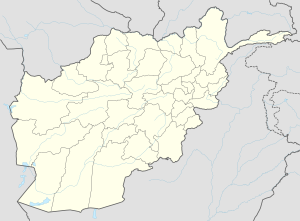Herat Citadel: Difference between revisions
No edit summary |
No edit summary |
||
| Line 57: | Line 57: | ||
| website = |
| website = |
||
}} |
}} |
||
The '''Qala |
The '''Qala Ikhtyaruddin''' ([[Pashto]] ; [[Dari]]: قلعه اختیارالدین), or '''Citadel of Herat''' ([[Afghan language|Pashto]]: سکندرۍ کلا ; [[Dari]]: ارگ هرات), is a fort located in the center of [[Herat]] in [[Afghanistan]]. It dates back to 330 BC, when [[Alexander the Great]] and [[Ancient Macedonian army|his army]] arrived to Afghanistan after the [[Battle of Gaugamela]]. Many empires have used the fort as their headquarters over the last 2,000 years, during which it was destroyed and rebuilt many times. |
||
From decades of wars and neglect, the citadel began to crumble but in recent years several international organizations decided to completely rebuild it. The ''National Museum of Herat'' is also housed inside the citadel, while the [[Council of Ministers (Afghanistan)|Afghan Ministry of Information and Culture]] is the caretaker of the whole premises.<ref name=Riechmann/><ref name="unesco">{{cite web |url=https://whc.unesco.org/en/tentativelists/1927/ |title=City of Herat - UNESCO World Heritage Centre |publisher=Whc.unesco.org |date=2004-08-17 |access-date=2011-07-25 |archive-date=2020-06-23 |archive-url=https://web.archive.org/web/20200623080658/https://whc.unesco.org/en/tentativelists/1927/ |url-status=live }}</ref> |
From decades of wars and neglect, the citadel began to crumble but in recent years several international organizations decided to completely rebuild it. The ''National Museum of Herat'' is also housed inside the citadel, while the [[Council of Ministers (Afghanistan)|Afghan Ministry of Information and Culture]] is the caretaker of the whole premises.<ref name=Riechmann/><ref name="unesco">{{cite web |url=https://whc.unesco.org/en/tentativelists/1927/ |title=City of Herat - UNESCO World Heritage Centre |publisher=Whc.unesco.org |date=2004-08-17 |access-date=2011-07-25 |archive-date=2020-06-23 |archive-url=https://web.archive.org/web/20200623080658/https://whc.unesco.org/en/tentativelists/1927/ |url-status=live }}</ref> |
||
Latest revision as of 18:47, 5 January 2025
| Citadel of Herat | |
|---|---|
| Herat in Afghanistan | |
 View of Herat Citadel from atop the premises. | |
| Coordinates | 34°20′45″N 62°11′19″E / 34.34583°N 62.18861°E |
| Site information | |
| Owner | Afghan Ministry of Information and Culture |
| Open to the public | Yes |
| Condition | Restored 2011 |
| Site history | |
| Built | 330 BC |
| Materials | stone, baked bricks, fired bricks |
The Qala Ikhtyaruddin (Pashto ; Dari: قلعه اختیارالدین), or Citadel of Herat (Pashto: سکندرۍ کلا ; Dari: ارگ هرات), is a fort located in the center of Herat in Afghanistan. It dates back to 330 BC, when Alexander the Great and his army arrived to Afghanistan after the Battle of Gaugamela. Many empires have used the fort as their headquarters over the last 2,000 years, during which it was destroyed and rebuilt many times.
From decades of wars and neglect, the citadel began to crumble but in recent years several international organizations decided to completely rebuild it. The National Museum of Herat is also housed inside the citadel, while the Afghan Ministry of Information and Culture is the caretaker of the whole premises.[1][2]
Recent restoration
[edit]
The citadel of Herat was completely renovated between 2006 and 2011. The latest restoration involved hundreds of Afghan craftsmen and funds from the Aga Khan Trust for Culture and about $2.4 million from the U.S. and German governments.[3]

About 1,100 items from the Herat region are stored inside the museum at the citadel and many have been on display.[1]
At a ceremony in October 2011, U.S. Ambassador Ryan Crocker stated that: "Until 35 years ago, tourists from around the world came here to experience heritage, history and incomparable national landscapes... We look forward to the day when Afghans and visitors from around the world will once again come here to learn about Afghanistan's rich history and enjoy the great hospitality and beauty that this land and its people have to offer." Also present on the occasion was Afghan-expert Nancy Dupree and this is what she had to say: "I've been here many times, but it was crumbling... This is impressive.... I think the most exciting thing is to see something finally accomplished. I have seen so many half-finished things."[1]
Gallery
[edit]-
Inside view
References
[edit]- ^ a b c Restored citadel is symbol of hope in Afghanistan Archived 2016-03-16 at the Wayback Machine. Deb Riechmann. October 17, 2011.
- ^ "City of Herat - UNESCO World Heritage Centre". Whc.unesco.org. 2004-08-17. Archived from the original on 2020-06-23. Retrieved 2011-07-25.
- ^ "Restored Citadel of Herat poignant reminder of past Afghan glory". Los Angeles Times. 2011-11-17. Archived from the original on 2013-12-18. Retrieved 2013-12-10.




